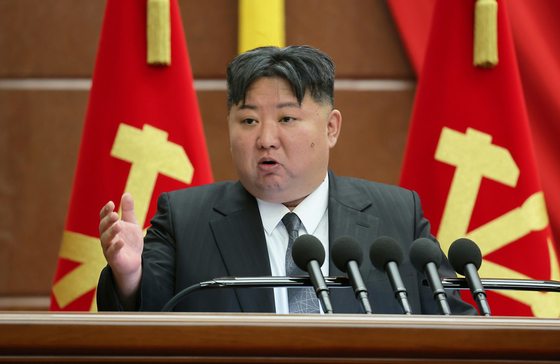North Korea has declared its “toughest” counteraction strategy toward the United States during a key party meeting, asserting that the military cooperation among South Korea, the U.S. and Japan has expanded into an aggressive nuclear military bloc, state media reported Sunday.
The strategy was put forth during the annual year-end general meeting of the Central Committee of the Workers’ Party of Korea, held from Monday to Friday and presided over by North Korean leader Kim Jong-un, the Korean Central News Agency (KCNA) said.
The U.S. is the “most reactionary” state, unwaveringly adhering to anti-communism as its national policy, the KCNA reported, adding that Kim clarified in his concluding speech “the strategy for the toughest anti-U.S. counteraction to be launched aggressively” for its long-term national interests and security.
Kim accused the military cooperation among Seoul, Washington and Tokyo of expanding into “a nuclear military bloc for aggression”, saying that South Korea has turned into “an out-and-out anti-communist outpost of the U.S.”

During the meeting, Kim ordered the enhancement of the military’s “capabilities for fighting a war” to meet the demands of modern warfare and the “ever-changing” war scenario and execution mode of enemies, the KCNA also said.
“Kim Jong Un clarified the strategic and tactical policies for more reliably guaranteeing the bolstering of war deterrence for self-defence through accelerated progress of defence science and technology and radical development of the defence industry to cope with the ever-increasing military provocations of the U.S. and its vassal force,” it said.
The meeting also put forth the task of positively promoting “the development of relations with the friendly countries that respect the dignity and interests” of North Korea, the KCNA said, without specifying the nations referred to.
Referring to the “successes” achieved this year in external affairs, the KCNA said that the country has responded “smartly” to the “unsteady structure” of international relations and has firmly established itself as a force that promotes “the building of a rightest multi-polar world.”
North Korea uses the annual year-end party meeting as a venue to evaluate its achievements for the year, set policy directions for the following year and address personnel and organizational matters.
The meeting is closely watched by outsiders to gauge the direction of the country’s foreign, defense or other key policies, but this year’s gathering provided little substance compared to previous years and did not clarify what the “toughest” strategy toward the U.S. would be.
Yang Moo-jin, president of the University of North Korean Studies, predicted that “North Korea may maintain its evasiveness until the North Korea policy of the Donald Trump administration becomes tangible.”
During the session, Pak Thae-song, a party secretary, was appointed premier, replacing his predecessor Kim Tok-hun, who had served in the role since his appointment in 2020.
Pak, elected as a member of the party Central Committee’s Political Bureau (Politburo) in 2021, has been among the top cadres seen alongside Kim during his recent major public activities, including his summit with Russian President Vladimir Putin at Russia’s Vostochny space center last year.
In the personnel reshuffle, Kim Jong-gwan was named vice premier, while Kwon Song-hwan and Kim Yong-sik were appointed as new ministers for resources development and commerce, respectively, in a move widely seen aimed at accelerating the implementation of the country’s economic policies.
Foreign Minister Choe Son-hui and Ri Yong-gil, chief of the Korean People’s Army general staff, were also elected as members of the Politburo, the KCNA said.
The two are believed to have earned promotions in recognition of their roles in strengthening North Korea’s relations with Russia through recent back-to-back exchanges and the deployment of North Korean troops to fight for Russia in its war against Ukraine.
Yonhap





